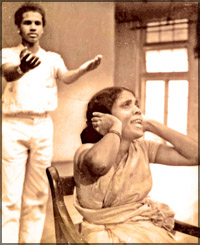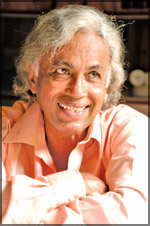|
A Critique on the State Sinhala Drama Festival of
1966:
Manaranjana Wadawarjana introduce novel techniques to Sinhala
theatre
|

Anula Karunatilaka and Sadun Wijesiri.
|
'An actor is one who
is made and not one
who is born' should be
the motto of
Sinhala theatre
Subject matter of realistic conversational original Plays in 1960's
by Prof. Ariya Rajakaruna
Translated by Ranga Chandrarathne
(This is a translation of a critique by Prof. Ariya Rajakaruna. He
served as the Head of the Department of Sinhala of the University of
Peradeniya. He is currently a visiting lecturer of the Department of
Fine Arts and Sinhala. This is the only comprehensive review written on
any State Sinhala Drama Festival held during the past five decades.
This review was first published in 1967. This critique has been
translated for the first time)
(Continues from the last week)
|

Lucian Bulathsinhala
|
Some dramas in the festival had a mixture of songs, music, dance,
acting and conversation with a blend of Eastern and Western
characteristics of theatre. This type of drama with mixed
characteristics are seen evolving in Sinhala theatre, preserving their
diversity as a distinct tradition.
'Manaranjana Wadawarjana', 'Bihivanu Bosatanane ', and 'Erabadu mal
pottu pipila" dramas can be considered as similar class of dramas with
similar characteristics. Henry Jayasena's 'Manaranjana Wadawarjana' is a
drama written with a different approach. This has contributed to broaden
the spectrum of subject matter in Sinhala theatre. It is based on a
strike.
The drama contains a series of events that highlights tragic as well
as hilarious aspects of a Strike. Jayasena's weakness in other creations
can also be seen in this production.
The weakness in text-writing. Jayasena failed to woven the drama in a
logical manner, incorporating events such as workers' commencing the
strike, foremen joining it, delivering speeches, a clerk not
participating in the strike, parade chanting slogans, some workers being
dosed with liquor, strike affecting the family life, some becoming
disenchanted with, being impatient out of despair, women lending money,
earning by foul means, the person who did not participate in the strike,
his death by shooting and all attending the funeral.
The construction of the drama was very weak as inappropriate
incidents have not been discarded and not sequencing the different
incidents incorporating only the suited.
The drama in general failed to convey the vision that is articulated
at different points and through the last song.
Though the drama is weak in structure, it has important
characteristics. This is not a familiar drama for the Sri Lankan
theatre. In the drama there is no conflict between two or more
characters.
This drama is based on a collective experience. And the suited acting
for this collective experience was estranged to Sinhala theatre.
The biggest contribution that drama made to Sinhala theatre is the
introduction of a lot of techniques to Sinhala theatre. Dramatist was
able to utilize the entire stage. He used the fleet of steps in the
middle of the stage to intensify the zest. Actors and actresses sitting
on it, lying on it and emerging from it is a pleasing scene to the
audience.
Middle of the stage was a transparent wide screen enabling audience
to see the action going on behind the stage. When the negotiations are
conducing with the ruling party, some actors hold placards carrying
slogans before the screen. An actor before the wide transparent screen
is delivering a speech.
From time to time his voice sinks and then he suggests that he speaks
in gesticulations. Another actor beyond the wide screen commence the
speech from the point the former stops the speech.
The dramatist creates a theatrical zest using incidents such as the
above in accordance with drama techniques. On one corner of the stage
are Gunawardena couple (Sathischandra Edirisinghe and Grace de Silva) on
the other are Perera couple (Karunapala Gamage and Gunawathi
Ramawickrama). Conversations among them are dramatic.
When Yasawathi (Padmakumari Gunasekara) whispers to Gunawathi (Manel
Jayasena), instead of gesticulation music is used. Considering the
subject matter of the drama, use of this type of techniques is
appropriate. Jayasena is able to introduce number of novel techniques to
Sinhala theatre through the drama 'Manaranjana Wadawarjana' Jayasena's
portrayal of a drunkard's character is a good acting according to
stylist acting.
Audience should draw the attention on to Bandula Jayawardena's
"Bihivanu, Bosathanani" on several counts. This is based on Insect Play
(1922) by a Czech Dramatist Karel Carpeck and his brother Jasel
(1890-1938). Therefore, this drama should also include in the category
of adaptations.
However, the absence of common defects in other adaptation is a
marked characteristic in this production. One who read the Insect Play
could not identify "Bihivanu, Bosathanani" as a drama based on it.
Indigenous outlook of the drama was visible enough to mislead the
audience. This is a characteristic of a good adaptation. In the
production an indigenous method has been used.
In accordance with the subject matter this method is thought to be
appropriate. In terms of rendering an indigenous outlook to Western
adaptation, Jayewardene is more talented that all other dramatists who
adapt Western dramas.
Another important aspect of "Bihivanu, Bosathanani is that the
dramatist in the drama (Lakshman Fernando) goes in search of a
prostitute in order to create a piece of art. Here dramatist ridicules
the weakness among contemporary literati in only considering issues of
sex for their creations.
It has been confirmed that the subject matter of Sinhala drama should
be diverse and wide through 'Bihivanu, Bosathanani'.
It is important to compare 'Bihivanu, Bosathanani' with the Insect
Play. The Insect Play is a comedy consisting three episodes and two
sections known as Commencement and the End.
The Section Commencement contains a conversation between aimless
loiters and a swollen-headed person. In 'Bihivanu, Bosathanani' the
aimless loiter becomes a beggar while the swollen-headed man becomes a
dramatist. |

